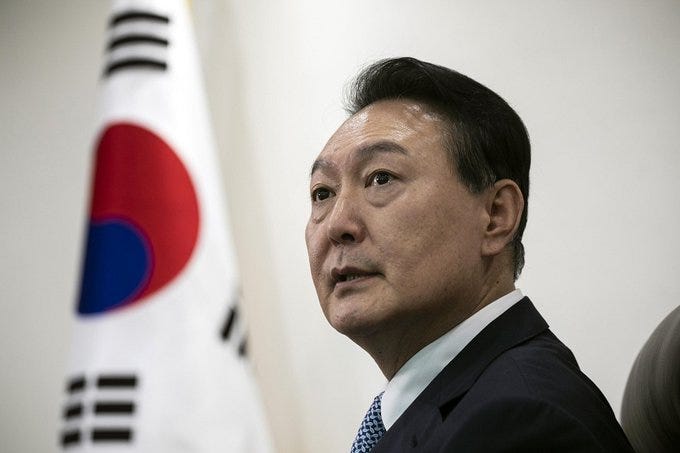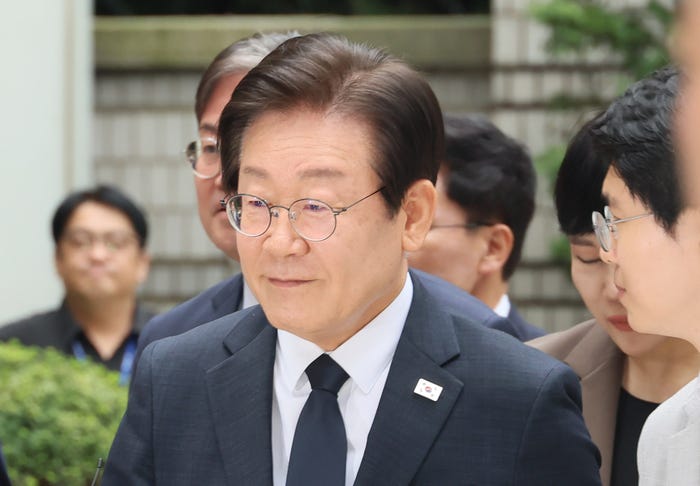After an extraordinary political episode involving South Korean President Yoon Suk Yeol’s abortive December 3 declaration of martial law, his ruling People Power Party’s move to resist impeachment and protect him appears likely to succeed, at least for now, despite disapproval from across the South Korean political spectrum. Impeachment requires a two-thirds majority in the 300-member National Assembly, which would oblige the six-party opposition coalition to find eight defectors from the government party, unlikely even despite condemnation from many of his own allies.
The ruling party members fear that the downfall of Yoon’s government could pave the way for another leftwing populist regime to take over. Nonetheless, Yoon is now the target of international condemnation, making it uncertain how long he can survive, even with the backing of his die-hard allies. The center-left Democratic Party, supported by industrial unions and the underprivileged urban poor, is determined to retake the government from the conservative, pro-business section of voters. The Korea Gallup Poll shows Yoon’s popularity today down to 13 percent, the lowest on record.
While the immediate crisis was short-lived, Yoon’s gaffe could have longer-term policy ramifications both at home and abroad, with the country’s most important ally the United States facing its own political uncertainties with the election of former President Donald Trump, a reluctant internationalist who mistrusts treaties and who returns to office on January 20. Trump has stated he intends to restart dialogue with Pyongyang and he might prefer Yoon’s archrival, Democratic opposition leader Lee Jae Myung despite his political baggage. Yoon’s recent efforts to expand and institutionalize bilateral and multilateral security cooperation may be in peril.

Acute polarization between the conservative PPP and the populist, left-leaning Democratic Party has been at the roots of the current crisis, as the embattled president has fought attempts to take control of the parliamentary floor since April 10 general elections that gave the Democrats a 175-seat majority of the 300 seats to 108 for the ruling PPP. The Democrats, under Lee, have been fighting fang and claw to keep the government on the defensive, passing motions and resolutions resisting Yoon’s legislative programs and resorting to a series of impeachments of major government appointments even before they were sworn into office. Several state prosecutors appointed to probe allegations of corruption involving the Democratic Party officials have also been impeached before taking office.

Beyond policy differences, the opposition has been waging a vigorous campaign to discredit the government over allegations of corruption involving Yoon’s wife, who faces accusations of bribery, influence-peddling and stock market manipulation. Lee’s party has rejected the results of investigations by government prosecutors that largely absolve her. Unmollified, the opposition is now demanding an independent counsel investigation, which the governing party rejects.
The issue of corruption and venality is an overarching problem for all sides of South Korea’s political spectrum. While Yoon’s wife has been widely criticized for allegations of accepting bribes (she reportedly accepted a brand-name pouch from someone claiming to be a friend of her father’s), Yoon has persistently refused to accept an independent counsel probe, with the opposition camp understandably rejecting all probes by the government itself.
No less concerning have been charges of corruption on a spectacular scale involving Lee Jae Myung, who faces altogether half a dozen separate charges of crimes ranging from approving illegal construction permits for housing projects outside Seoul, using his previous posts as mayor and provincial governor. At one of the most recent court hearings, he was convicted of election law violations as well and sentenced to a year’s prison, suspended for two years.
With at least five people who had worked for him when he was a city mayor and governor taking their lives to avoid answering court subpoenas, Lee has recently risen in the public consciousness as a paragon of venal politician. Among the more serious charges is an allegation that he had a garment maker pay U$8 million to North Korea as a bribe to get him invited by Kim Jong Un’s regime to Pyongyang to embellish his image as potential presidential timber. Lee and the Democrats began escalating attacks on the Yoon government following the 2022 elections won by the PPP by a hairsbreadth margin of 48.56 percent to 47.83 percent with the opposition seizing the majority of 190 seats in the National Assembly.
Against the accelerating confrontation on the assembly floor, Yoon, a political novice who was formerly a state prosecutor, took what an American senior diplomat described as a “badly misjudged” initiative in calling for martial law. He was supposedly unaware of his country’s political history. South Koreans have grown tired of any more military rule, the last phase of which ended 45 years ago after four decades of having the generals in charge.
When Yoon declared martial law this week, attacking what he described as “anti-state forces trying to paralyze the essential functions of the state and disrupt the constitutional order of our liberal democracy,” he was referring to Democratic Party behavior on the assembly floor under Lee’s agitation. “We must stop this impeachment campaign being used by Lee Jae Myung as an excuse to escape criminal conviction himself and take power,” said Han Dong Hoon, the top government party leader.
But Yoon’s statement, if accurately describing the country’s political divisions, has fallen clearly short of justifying his bid to implement martial law, incredibly misreading the political mood of his countrymen. Martial law has become an outdated as well as unwelcome solution. Today, South Koreans of all political shades hold noisy rallies in the downtown section of the capital each Saturday, with busloads of protesters moved from all parts of the country. Even regular changes of government every five years, and general elections every four, haven’t been enough to accommodate divergent political demands.
It was thus small wonder that Yoon’s martial law statement fell flat, with tens of thousands of people from all over the country filling up Seoul’s main thoroughfare. Within hours of Yoon’s broadcast, multitudes had converged on the National Assembly building, some breaking glass to enter the Assembly chambers.
With thousands of citizens on the streets, there was no chance that the military could seize the parliament building to stop legislators from arriving to reverse Yoon’s declaration. Those who managed to enter the plenary session chamber quickly started a voting process vetoing the declaration. A total of 190 legislators from both parties had broken into the chamber to vote against martial law, forcing Yoon to rescind the decree just hours after declaring it.
While fiercely agitating for independent investigation of the president’s wife, the Democrats stand accused of running weekly protest marches in Seoul partly to cover party boss Lee’s transgressions. It appears uncertain at this stage if he himself will survive multiple rounds of court hearings slated before the next presidential election which now appears likely to be advanced in view of attempts to remove Yoon from office, which appear likely to intensify.




















